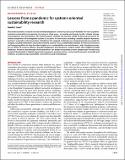Lessons from a pandemic for systems-oriented sustainability research
Author(s)
Selin, Noelle E
Downloadeabd8988.full.pdf (260.9Kb)
Publisher with Creative Commons License
Publisher with Creative Commons License
Creative Commons Attribution
Terms of use
Metadata
Show full item recordAbstract
This review examines research on environmental impacts of coronavirus disease 2019 (COVID-19) from a systems-oriented sustainability perspective, focusing on three areas: air quality and human health, climate change, and production and consumption. The review assesses whether and how this COVID-19–focused research (i) examines components of an integrated system; (ii) accounts for interactions including complex, adaptive dynamics; and (iii) is oriented to informing action. It finds that this research to date has not comprehensively accounted for complex, coupled interactions, especially involving societal factors, potentially leading to erroneous conclusions and hampering efforts to draw broader insights across sustainability-relevant domains. Lack of systems perspective in COVID-19 research reflects a broader challenge in environmental research, which often neglects societal feedbacks. Practical steps through which researchers can better incorporate systems perspectives include using analytical frameworks to identify important components and interactions, connecting frameworks to models and methods, and advancing sustainability science theory and methodology.
Date issued
2021-05Department
Massachusetts Institute of Technology. Institute for Data, Systems, and Society; Massachusetts Institute of Technology. Department of Earth, Atmospheric, and Planetary SciencesJournal
Science Advances
Publisher
American Association for the Advancement of Science (AAAS)
Citation
Selin, Noelle E. "Lessons from a pandemic for systems-oriented sustainability research." Science Advances 7, 22 (May 2021): eabd8988. © 2021 The Authors
Version: Final published version
ISSN
2375-2548